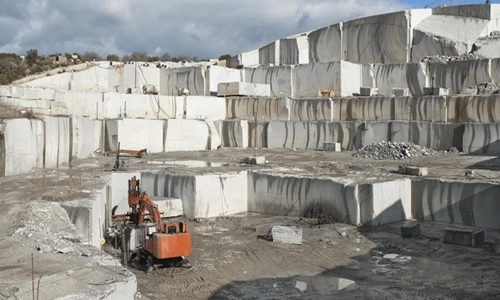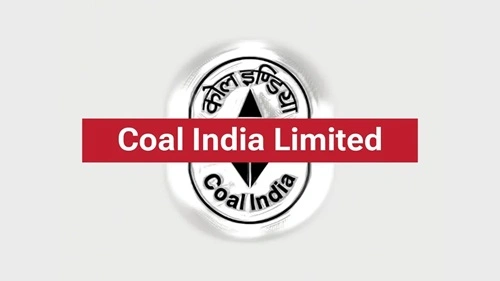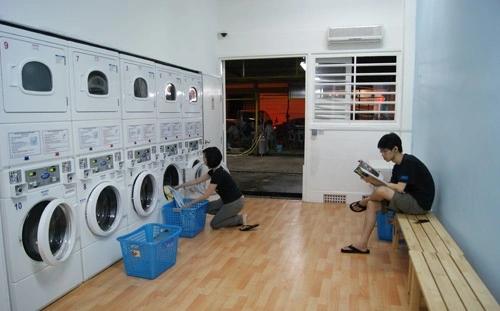Granite blocks undergo a transformation journey from the extraction of raw natural stones in quarries to crafted polished finished slabs at the processing units. These stones are ready for various applications both for exterior and interior uses. All these actions are being done under the control of expert granite blocks exporters.
Here, we present the process of quarrying, production, and exportation of granite blocks in detail. For better clarity, we take one of the top granite blocks exporter in India, Soni Granites Mining Company as the ideal example.

The Extraction Process: Quarrying Granite Blocks
India is a country with hugely available deposits of granite; hence, it stands as one of the largest granite-producing as well as exporting countries of the world. The geographical locations of granite quarries within India are found mostly in the southern and northern parts. The journey of a granite block initiates where huge raw stone formations are carefully extracted through a series of technical processes.
Quarrying Techniques
- Accessing Granite Deposits: The process starts by gaining access to granite reserves through removing layers of earth, vegetation, and rock.
- Drilling and Cutting: Holes are drilled along the perimeter of the granite deposit. Diamond-wired saws are commonly used to cut the stone out of the surrounding rock.
- Splitting: It is followed by splitting, with hydraulic splitters or small explosive charges serving to actually split the stone into manageable blocks once the granite has been loosened.
- Inspection and Quality Check: Extracted blocks of granite are transported to areas of inspection, where these are checked according to their size, fissures, cracks, and color consistency. Blocks that qualify during the process of inspection are selected for processing.
Granite Block Processing: From Rough to Polished
After the granite blocks are extracted and processed, they are taken to the processing factories where they are processed for finished products that are ready to export. Soni Granites Mining Company, headquartered in Rajasthan, India, has a state-of-the-art block processing facility. With the latest technology applied, its Morwad plant processes black stone blocks, which are exported to various countries around the world like the U.S.A., Jordan, and Bangladesh.
The key granite processing stages are:
- Block Cutting: Big blocks of granite are brought down to a reasonable size using diamond-tipped saws, cut out into slabs, the size and thickness customized according to the requirements of the client.
- Grinding and Polishing: The granite slabs, after being cut, are grinded to remove the rough edges; thereafter, polishing to give it a natural shine. It is also done in order to obtain the correct degree of glossiness on the slabs. Most of the high-quality slabs should have at least an 85 reading on the gloss meter.
- Epoxy Application: Epoxy is applied to fill hairline cracks or fissures in some of the granite slabs. This is important in ensuring that the slab is structurally sound, with no flaws.
- Final Inspection: Each slab is further inspected for thickness, color, and polish uniformity. Any deviations are corrected before the slabs are prepared for export.
Quality Control: Ensuring the Best Granite for Export
Stringent quality control at each and every level of production ensures that the blocks produced are of international standards. Top granite blocks exporter follows a strict quantitative procedure for quality inspection to hone every block and slab to meet high specifications, and the factors considered in quality control are:
- Checking for Impurities: The slab is inspected for the presence of fissures, cracks, lines, speckles and patches.
- Polish Quality: The shine of the polished granite is measured by a device called a gloss meter. As obvious as it sounds, the higher the value of the gloss, the finer the finish.
- Uniformity in Size and Thickness: Slabs are tested for any deviation in size or thickness. The only variation that is allowed is approximately 1 mm in width or length.
- Edge Cuts: The edges of the slabs are checked to ensure proper trimming and are kept straight.
Different from field tests, some laboratory tests give information on durability, porosity, strength as well as the potential of water absorption by the granite. These tests ensure that the slabs are fit for various demands on construction sites with aesthetic appeal.
Packing and Delivery:
Once the processing of granite slabs is complete and they’ve passed inspection, preparation for export may proceed. Proper packing and loading are crucial to ensure that the granite reaches its destination in perfect condition.
Key Steps in Packing:
- Cargo Check: The condition of the packed granite is thoroughly inspected to ensure that it is secure and protected from damage during transit.
- Use of Sturdy Packing Materials: Granite slabs are packed using strong crates and packaging materials. These can withstand the weight and impact of shipping.
- Loading into Containers: Carefully loaded filled crates are then sent to the nearest ports by containers.
Eco-Friendly Practices in Granite Block Exporting
With growing concern for sustainability in nearly all industries, this is no exception in the granite block exporting business also. This has become one of those industries that have taken ecological concern into consideration and put the exporters into specific environmental responsibilities.
Techniques of Sustainable Quarrying:
- Granite Waste Recycling: In each stage of quarrying, a very huge quantity of wastes are generated. Instead of waste disposal, it is often reused for construction, land filling, or as aggregate material.
- Energy-Efficient Quarrying: It is also a fact that sophisticated machinery at the places of quarrying and energy-efficient methods applied during testing ensure lesser environmental impact due to granite production.
- Reduced Carbon Footprint: The exporter minimizes the carbon footprint that is involved in exporting the granite blocks to the international markets mainly through optimized routes of transport and mainly by using eco-friendly packaging materials.
Endnote:
From quarry to export, each block of granite tells the tale of determination, skill, and adapted technology from top granite blocks exporters such as Soni Granites Mining Company.
Whether it’s a residential project or a commercial development, granite blocks from Soni Granites Mining Company are a reliable and durable choice, offering clients the perfect balance of natural beauty, strength, and sustainability.

